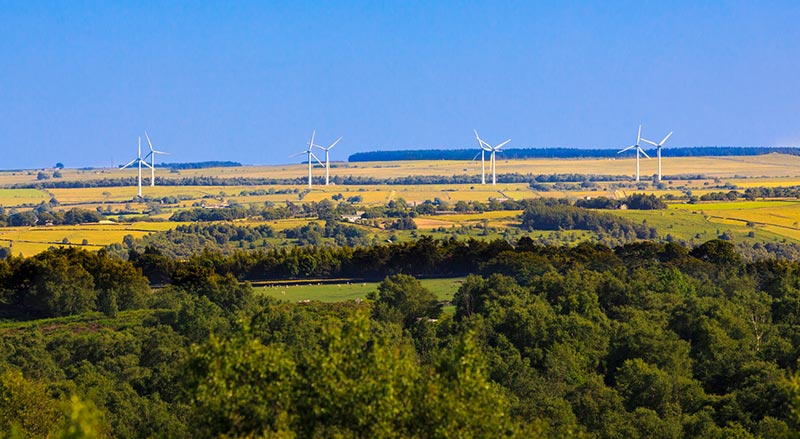Driving the energy transition to ensure a just and prosperous future
Our research is at the forefront of the energy transition. Guided by our innovative spirit and interdisciplinary outlook, we work to mitigate climate change while transforming our energy system, to enable a just and prosperous future for all.
Across every aspect of energy, from how we best harness it, to how we can transform and use it, our passionate community of researchers are committed to making a positive difference now and for generations to come. Our legacy gives us the drive to both resolve current challenges and pave the way to a clean and just energy future.
Embracing the urgency and scale of the challenge, we’re developing solutions ready for immediate deployment, that can deliver rapid reductions in carbon emissions. Our experts across engineering, science, social science, health sciences and policy, are transcending disciplinary silos and partnering with governments, industries and communities to create interventions that deliver impactful and immediate change for people both locally and globally.
We’re looking to accelerate this transformation within the next two decades. Pushing boundaries, we’re part of a movement which will transform the energy system, and support local, regional and national leaders in meeting pressing zero carbon targets across systems and scales. We’re challenging how things are done now, exploring ways to integrate technical and social innovations into existing infrastructure, and making room for new energy capabilities that can improve people’s lives.
For future generations, we’re harnessing our curiosity to advance the fundamental science. We’re building our capability to anticipate new energy and materials challenges as AI and digitisation reshape our world, and exploring how new technologies from nuclear fusion to biologically produced hydrogen, could change the way we produce and use energy forever.
At Manchester, we do more than just research. We innovate to create impact that lasts.
Our research covers
Technological change happens because of people and their social contexts, whether it’s through the way we access, respond to, or use technology, how we make the decisions that drive investment, or through our innovations as researchers. Our work places people at the forefront of this change.
- Understanding, engaging and supporting people’s experiences of living through an energy transition.
- Drawing out insights into the drivers and outcomes of energy poverty and inequality in relation to social participation, wellbeing and health.
- Evaluating the implications of decisions by ensuring planning is holistic, rather than just swapping one technology for another.
- Guiding local, national and international policy, and industrial and organisational decision making, by driving two-way conversations to inform decisions based on scientific evidence.
- Planning for the places people live, through research into the implications of energy consumption, and the impact on population health, jobs, and the physical environment.
- Identifying the catalysts and constraints on adoption of new technologies and processes, and developing strategies to foster an energy transition that is just and prosperous, to provide benefits to people through their homes, communities, workplaces, job opportunities, and within the wider economy.
The energy transition demands change across the interconnected web of physical, social and digital infrastructure. Taking a systems approach to retrofitting and designing novel infrastructure that can balance the diverse needs of society, while minimising impacts on the environment, will be central to a successful transition.
- Designing and testing the infrastructure needed to support zero carbon energy systems, nationally and internationally. Our expertise covers nuclear for power and zero carbon fuels, renewables, hydrogen, energy storage, electricity grids and distribution, district heating, and geothermal networks.
- Understanding what an energy system transformation means for society and considering how infrastructure affects lives, from day-to-day adaptation to broader health, economic, and social impacts.
- Delivering efficiency in energy use through developing low loss electronics for low power systems and smart computing solutions to minimise energy consumption.
- Designing and developing the connected networks required to decarbonise energy, to leverage and link the technologies that can deliver energy efficient carbon-free electricity, heat, and transport.
- Identifying and delivering the skills and workforce needed to deliver an energy transition – from digital engineering and reactor construction, to fitting heat pumps and insulating buildings.
- Applying digital approaches, big data, robotics and AI to optimise maintenance and management of energy systems.
Our energy system can evolve and respond to the world around us, as new fundamental insights emerge through the innovation and creativity of our researchers.
- Using lab-based exploration to create the technologies, applications and materials which could be fundamental to future energy systems.
- Pioneering discovery science in future technologies, from nuclear fusion to the development of green fuels.
- Drawing on subsurface, geoscience and geoengineering expertise, and research into the absorptive properties of materials, to identify long term grid-scale energy storage solutions.
- Exploring novel approaches to exploiting cleaner energy sources, such as synthetic fuels from biological sources, or using computational fluid dynamics to get the most out of wind farms.
- Pioneering new processes to use less energy, such as digital twinning to test before building physical prototypes, smart algorithms to minimise computing power, and advances in machine learning to avoid anticipated AI-related energy consumption increases.
- Advancing materials research and 2D material innovation to develop the materials that support a low carbon, resilient and financially-viable energy system.
Our researchers are leading on exploration into the technologies that can limit future damage to the earth’s system, and provide sustainable energy solutions for hard-to-abate industries.
- Identifying and assessing new technologies to trap released carbon, remove it from the atmosphere and secure it in long term storage sites in the subsurface.
- Working with industrial clusters to co-create whole system solutions to accelerate a green industrial transition.
- Leading UK expertise in direct air capture technology, understanding its potential and how best to communicate this to industry and the public.
- Devising solutions that optimise bioresource use and consider the role of capturing and storing any carbon released, while embedding biodiversity concerns.
- Working with foundation industries to reduce energy consumption through more efficient use of resources and innovative approaches to sustainable use of raw materials.
Key centres and institutes
Tomorrow Labs
Discover the cutting edge facilities where you can access the expertise and equipment you need to address your energy research needs.
Events
-

Interdisciplinarity &: 2026 Series - Harnessing Storytelling to Amplify Research
18 March 2026, 1.45pm-2.45pm
How can we ensure our interdisciplinary research creates real-world benefits? At The University of Manchester, we recognise that transformative research requires not just technica.. -

Interdisciplinarity &: 2026 Series - Co-Authorship: Rotating Roundtables
21 April 2026, 2.30pm-4.30pm
Co-authoring can offer significant benefits in interdisciplinary research bringing together experts from various fields to produce impactful publications. How can we effectively ma..
Connect with us
For business
- Leverage our expertise, facilities and network to develop solutions to your challenges.
- Gain access to some of the brightest minds working across our research pathways to help you make change happen.
For policy work
- Connect with our researchers to build relationships, explore areas of interest and enhance your understanding of pressing policy challenges.
- Access high quality policy articles and publications from our academics.
Search our research database
- Use Research Explorer to access publications, activities and more.
- Search researcher profiles and connect with fellow experts.
General enquiries
Speak to our research beacons team who can help connect you with the expert you're looking for.
Research at Manchester
Find out more about the breadth and depth of research at our University.









